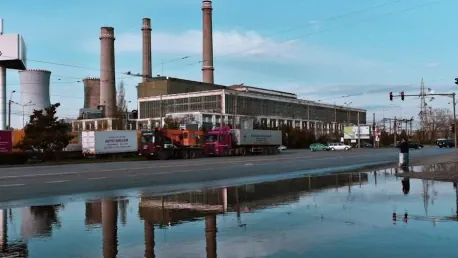Discussing in detail the potential transformative effects of biofuels on India’s economy and environment, Union Minister of Road Transport & Highways, Nitin Gadkari, recently addressed the International Methanol Seminar and Expo on October 17, 2024. Gadkari’s remarks centered on the significance of biofuels such as methanol, ethanol, and bio-CNG in decreasing logistics costs and enhancing supply chain efficiency. He emphasized how these changes can be pivotal in positioning India for economic competitiveness, especially amid the current backdrop of global geopolitical uncertainties. The economic burden of fossil fuel imports, approximately ₹22 lakh crore annually, could be significantly reduced by adopting alternative fuels, thereby easing financial constraints on the nation.
The minister pointed out two major issues: India’s heavy reliance on imported fossil fuels and the rising levels of environmental contamination. By advocating for the promotion of biofuels, Gadkari highlighted not just economic reasons but also the benefits to farmers, the agricultural economy, and India’s energy independence. NITI Aayog has been proactive in advancing methanol technology within the country, highlighting the importance of leveraging homegrown resources, such as low-rank coal, for methanol production. According to Gadkari, this approach has the dual advantage of aiding the ecosystem while also delivering economic benefits to the country.
Economic and Environmental Advantages of Biofuels
Gadkari emphasized that biofuels could significantly alleviate India’s economic dependency on imported fossil fuels, which drains a substantial portion of the country’s financial resources. Adopted widely, biofuels could reduce the annual financial outflow of ₹22 lakh crore on fossil fuels, allowing these funds to be redirected toward other crucial areas, such as infrastructure development, health, and education. Additionally, biofuels can serve as a sustainable alternative to current fuels, enabling a diversification of energy sources and reducing the vulnerabilities associated with a single energy supply chain. Gadkari further highlighted that embracing biofuels can bolster rural economies by providing farmers with additional revenue streams through the sale of agricultural waste and byproducts used in biofuel production.
On the environmental front, biofuels are viewed as a cleaner alternative to traditional fossil fuels. India grapples with significant pollution issues, particularly in urban areas, leading to public health challenges and environmental degradation. The use of methanol, ethanol, and bio-CNG can contribute to reducing harmful emissions. Methanol, for instance, burns cleaner than conventional gasoline, significantly reducing the output of pollutants such as carbon dioxide and nitrogen oxides. Ethanol, when blended with gasoline, reduces overall greenhouse gas emissions. Bio-CNG, derived from agricultural residue, not only contributes to waste management but also offers a renewable energy source that can alleviate the environmental impact associated with fossil fuel consumption.
Infrastructure and Agricultural Innovations
Beyond the direct economic and environmental benefits, Gadkari also promoted sustainable infrastructure development, advocating for the use of recyclable materials like plastic and tire powder in road construction. This innovative approach aids in reducing reliance on imported bitumen, thereby cutting costs and promoting the recycling of waste materials. Road construction using these recyclables is not just cost-effective but also enhances the durability and longevity of the roads, leading to long-term savings in maintenance costs. Gadkari’s vision encompasses a holistic approach to infrastructure that leverages waste materials, thereby addressing both economic and environmental concerns.
A key area of focus in Gadkari’s address was the utilization of agricultural residue to produce bio-CNG. Currently, there are about 475 bio-CNG operations, with around 40 facilities in states like Punjab, Haryana, Uttar Pradesh, and Karnataka converting rice straw into bio-CNG at a 5:1 tonnage ratio. This initiative targets the issue of stubble burning, a significant cause of seasonal air pollution in northern India. Converting agricultural waste into bio-CNG not only provides an alternative to fossil fuels but also addresses the problem of agricultural waste disposal. Gadkari’s strategy, thus, aligns environmental sustainability with economic benefits, showcasing a multidimensional approach to tackling India’s intertwined challenges of waste management and energy independence.
Public Adoption and Flex-Fuel Technology
Discussing the transformative potential of biofuels for India’s economy and environment, Union Minister of Road Transport & Highways, Nitin Gadkari, addressed the International Methanol Seminar and Expo on October 17, 2024. Gadkari emphasized the importance of biofuels like methanol, ethanol, and bio-CNG in reducing logistics costs and improving supply chain efficiency. He suggested that these measures could make India economically competitive, especially in the face of global geopolitical uncertainties. With fossil fuel imports costing around ₹22 lakh crore annually, adopting alternative fuels could ease the financial burden on the nation.
Gadkari identified two main issues: India’s dependence on imported fossil fuels and rising environmental pollution. By advocating for biofuels, he highlighted not only the economic advantages but also the benefits to farmers, the agricultural sector, and India’s energy self-sufficiency. NITI Aayog has been actively promoting methanol technology in India, emphasizing the use of domestic resources like low-rank coal for methanol production. Gadkari suggested this strategy offers dual benefits: environmental sustainability and economic growth.









